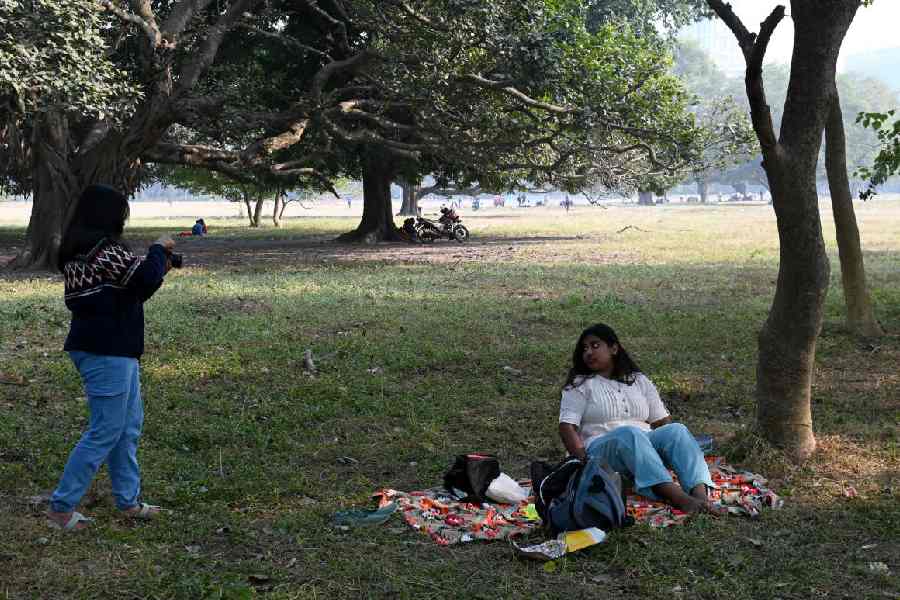Elusive spaces
Sir — The rise in urban loneliness is often tied to dwindling ‘third spaces’ — places other than home and office — such as cafés, parks and libraries where people can casually socialise. While parks and libraries are hard to come by in cities these days, cafés can be too expensive given the rising cost of living. Hearteningly, some homeowners in Bengaluru are opening up their houses for strangers to relax and socialise in after a long workday. But the allure of the original ‘third spaces’ had been that they belonged to no one in particular. While opening one’s home to weary strangers is a thoughtful initiative, being in these spaces is bound to be restricted by the rules and the preferences of homeowners. That cannot really be as relaxing as a community space.
Mohini Gupta,
Bengaluru
Apathetic state
Sir — The fulfilment of the sustainable development goals remains elusive in India predominantly due to the lack of political commitment (“The road ahead”, Feb 22). This is in spite of the fact that environmental injustice violates Article 48A of the Indian Constitution which aims to ensure equal access to a pristine environment to every Indian citizen. Recent incidents like the land subsidence in Joshimath and the landslides in Wayanad are examples of the State’s complicity in aggravating the environmental crisis. It is thus not surprising that India ranks a dismal 176 out of 180 countries in the 2024 Environmental Performance Index. Greater collaboration among the State, academics and civic society to ensure sustainability is the need of the hour. Organisations like the Indian Youth Climate Network can play a pivotal role in mobilising the youth for this purpose.
Prasun Kumar Dutta,
West Midnapore
Sir — In the article, “The road ahead”, Ramachandra Guha quotes the Marxist historian, Eric Hobsbawm, and the British economist, John Maynard Keynes, to support his argument that India should not mimic the energy- and capital-intensive model of industrialisation pioneered by Europe and North America given its higher population density, its history of colonial subjugation, and its fragile ecology. He advocates for a more environmentally-responsible pattern of economic development. Poorly designed economic policies are made worse by corruption and corporate greed, leading to landslides, adversely affecting biodiversity and depleting groundwater, among numerous other side effects. Such policies benefit a handful of the urban elite at the expense of poor people. The writer concludes with the hope that the younger generations will be inspired by movements like Chipko to take positive environmental action. But the greed and the materialism driving State policies are unlikely to be contained by the youth alone.
Jahar Saha,
Calcutta
Sir — Nine of the 10 hottest years on the planet have been recorded in the past decade. These were accompanied by heat waves, droughts, wildfires, hurricanes and severe floods.
India, one of the most populous countries in the world, has a rapidly shrinking forest cover. Even though Indians worship their rivers, this ends up leading to more pollution — the critical state of the sangam at Mahakumbh is a case in point. India is in dire need of environmentalists like Sunderlal Bahuguna and Saalumarada Thimmakka as well as movements like Chipko and Appiko because, unfortunately, policymakers are doing little to address climate change.
H.N. Ramakrishna,
Bengaluru
Sir — The road ahead for India’s environmental progress appears bleak. Shrinking forests lead wild animals to stray into human settlements in search of food. This, in turn, causes man-animal conflict and results in animals being hunted down by mobs. Wetlands are constantly taken up by land sharks, causing cities to become more polluted. The State should step up to protect wildlife and stop encroachment. Only then would the road ahead appear bright for future generations.
Alok Ganguly,
Nadia
Lax measures
Sir — Ragging continues to haunt Indian campuses (“Bullied”, Feb 24). Orders from the Supreme Court and directives of the University Grants Commission have not been implemented properly. What is worse, victims are often intimidated to protect institutional reputation. How do we ensure inclusivity in campuses and accountability on the part of the authorities to eliminate ragging? This is a pressing question that needs answering. Perhaps India should turn to other countries to learn from their best practices.
Anshu Bharti,
Begusarai, Bihar
Sir — From physical abuse to mental harassment, many students find themselves trapped in unrelenting cycles of violence on college and university campuses, often culminating in extreme consequences like suicides. The UGC has instituted a dedicated helpline to address complaints of ragging and spread awareness about the same. In spite of this, ragging continues to afflict higher educational institutions owing to a half-hearted enforcement of regulations, institutional apathy, and the reluctance of families to pursue protracted legal battles for justice. Concerted measures aimed at fostering an environment of genuine equality with a focus on nurturing empathy, respect, and accountability among students could perhaps stamp out the scourge of ragging.
M. Jeyaram,
Sholavandan, Tamil Nadu
Sir — It is unfortunate that students living in hostels to pursue higher education often face ragging and harassment of various kinds. Female students are also subjected to sexual harassment. It is the duty of the government as well as the institutions concerned to install CCTVs on campus to maintain security. At the same time, such surveillance should not leave female students more vulnerable. Their safety must be a priority.
Abhilasha Gupta,
Mohali











